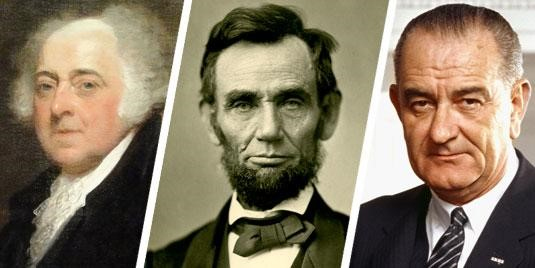

The Surprising Link between American Presidents and Mental Illness
Nearly half of U.S. presidents studied have battled some form of mental illness, including bipolar disorder, anxiety and depression. This is after psychiatrists at Duke University Medical Center analyzed presidential biographies from the years 1776 to 1974 and used criteria from the DSM-IV. Here are twelve presidents with mental disorders that prove it was still possible to be a successful leader:

#1 John Adams (1797—1801)
Adams served as the second president and the first vice president (1789—1797). Due to a history of “irrational behavior and emotional instability,” historians labeled Adams as “manicdepressive,” “slightly paranoid,” and “a man consumed by an irrepressible urge to master the world.” After using guidelines to assess for psychiatric disorders, researchers concluded this Founding Father met the criteria for bipolar II disorder.
#2 James Madison (1809—1817)
A founding father, Madison was hailed as the “Father of the Constitution for his pivotal role in drafting and promoting the United States Constitution and the Bill of Rights.” The fourth president battled major depressive disorder.
#3 John Quincy Adams (1825—1829)
Aside from serving as the sixth president, Adams also served as a diplomat, a senator and a member of the House of Representatives. He was portrayed “as the exemplar and moral leader in an era of modernization.” Adams suffered from major depressive disorder.
#4 Franklin Pierce (1853—1857)
A lawyer by profession, Pierce was the youngest man to be elected president to that point. The study found he suffered from alcohol dependence and major depressive disorder. It was known at the time that Pierce’s wife also suffered from depression for much of her life. All of the couple’s children died young. Pierce died of severe cirrhosis of the liver in 1869.
#5 Abraham Lincoln (1861—1865)
Served as the 16th president of the United States until his assassination in April 1865.
Researchers believe he suffered from “major depressive disorder, recurrent, with psychotic features.” In a letter to his first law partner, Lincoln writes: “I am now the most miserable man living. If what I feel were equally distributed to the whole human family, there would not be one cheerful face on the earth. To remain as I am is impossible; I must die or be better, it appears to me.”
#6 Rutherford B. Hayes (1877—1881)
The election of Hayes in 1876 was one of the most contentious in national history. He lost the popular vote to Democrat Samuel J. Tilden but won “an intensely disputed” Electoral College vote. Duke University’s psychiatrists diagnosed Hayes as having major depressive disorder.
#7 Theodore Roosevelt Jr. (1901—1909)
The statesman, author, soldier, explorer and reformer lived with bipolar I disorder. Renowned clinical psychologist Kay Redfield Jamison said the 26th president “came into the world a fullblown exuberant. In a 2002 talk, she characterized Roosevelt as “hypomanic on a mild day. He wrote 40 books, and read a book a day, even as president. He also went into an extended depression that saw him reinvent himself as a cowboy.”
#8 Woodrow Wilson (1913—1921)
Wilson was said to suffer with both anxiety disorder and major depressive disorder. Biographer
Edwin A. Weinstein writes that Wilson went through a “severe reactive depression” following his wife’s death. He felt his life was over, writes Weinstein, and said Wilson even expressed the wish that someone would take his life. “God has stricken me almost beyond what I can bear,” Wilson once wrote.
#9 Calvin Coolidge (1923—1929)
Biographer Robert E. Gilbert calls Coolidge “the most misunderstood chief executive in American history.” And while he’s often referred to as a ”do nothing president,” Coolidge.
Suffered from major depressive disorder, presumably brought on by the tragic death of his son. More serious, notes Gilbert, was the fact Coolidge essentially abdicated his presidential responsibilities while in this ongoing state of depression.
#10 Herbert Hoover (1929—1933)
Hoover gained two reputations in his lifetime: first was that he “twiddled his thumbs” while the Great Depression set in and in contrast he became known internationally as “the great humanitarian” during World War I for relief efforts in wartime Belgium. A successful mining engineer by trade, Hoover battled major depressive disorder.
#11 Dwight D. Eisenhower (1953—1961)
Eisenhower had a series of medical issues while in office, including a heart attack, a bowel obstruction and a stroke. He is said to have also battled major depressive disorder. Prior to his presidency, Eisenhower was a five-star general in the United States Army during World War II and served as Supreme Commander of the Allied Forces in Europe.
#12 Lyndon B. Johnson (1963—1969)
Johnson is said to have displayed manic episodes, an indicator of bipolar disorder as well as anxiety purportedly caused by the escalation of the Vietnam War. “It was a pronounced, prolonged depression,” Johnson’s press secretary Bill Moyers said. “He would just go within himself, just disappear—morose, self-pitying, angry.…..he was a tormented man.”







